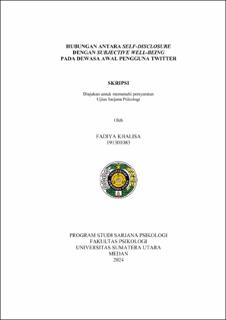Hubungan antara Self-Disclosure dengan Subjective Well-Being pada Dewasa Awal Pengguna Twitter
The Relationship between Self-Disclosure and Subjective Well-Being in Early Adulthood Twitter Users

Date
2024Author
Khalisa, Fadiya
Advisor(s)
Tuapattinaja, Josetta Maria Remila
Metadata
Show full item recordAbstract
This research aims to determine whether there is a relationship between self-disclosure and subjective well-being in early adult. Disclosing on social media not only as a way to express themselves, but also to create friendships and get social support. Having good friendships can improve subjective well-being due to the relief from expressing themselves and fulfilling the needs to socialize. This study uses a quantitative correlational method with a purposive sampling technique. The number of subjects in this study was 350 respondents (x̄ = 21.4 SD = 2.05) Twitter users aged 18-30 years. The research data were taken using a likert-scale questionnaire consisting of Self-Disclosure scale to measure self-disclosure, Satisfaction with Life Scale that adapted from Akhtar (2019) and Scale of Positive and Negative Experience by Diener (2009) to measure subjective well-being. Based on the Pearson's Product Moment correlation test conducted, the results of this study showed that there was no relationship between self-disclosure and subjective well-being in early adult Twitter users with a p value of .607 and a correlation coefficient value of r (350) of -.028. This means that levels of self-disclosure that carried out by early adult Twitter users are not related to the levels of subjective well-being.
Collections
- Undergraduate Theses [1427]
